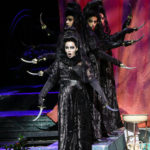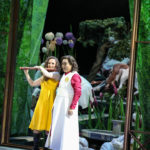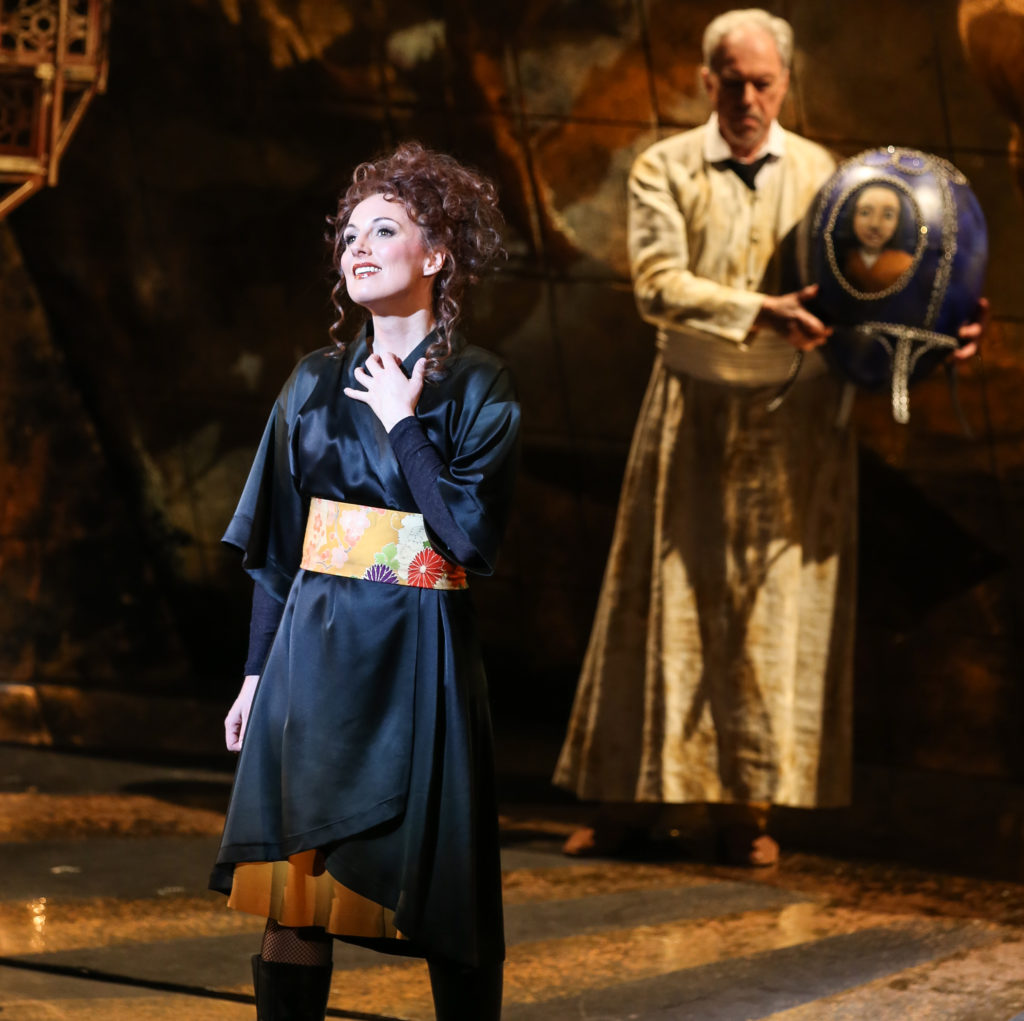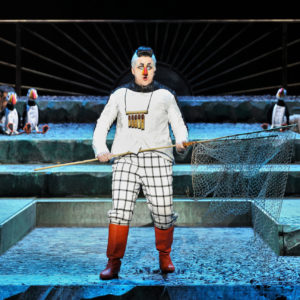The stage base consists of stone-like terraces eventually planted, erupting in a riot of fertility, celebrating marriage. The usually moribund religious order of Sarastro are dressed in radiant white; and the Court, which Pamina is abducted to, is defined by gold, with mirror effects suggesting the supernatural.
Only the opening staging seems a bit silly, the dragon, like a giant (artificial) snake decapitated, Tamino (JunHo You), in mustard and red, standing with a bow and arrow. The Three Ladies in black, prima donnas in their own right, sing of Tamino – collapsed, flat out: the most handsome man she’s ever seen. A matter of taste- but You’s tenor is indeed impressive throughout, complementing Anett Fritsch’s exquisite soprano as Pamina. Fresh, young casting, a new take on the safely predictable.
The outfits (Tamino’s) could be late 18th Century, Mozart’s time, but Jacob Semotan’s Papageno is weird, a space-age clown. Semotan is in white with black/white check trousers, and red breeches, matching his red nose; he prances around with a large butterfly net. The ‘birds’ he keeps are like penguins, ingenious, they’re mechanical. Semotan’s Papageno drives around in an antiquated motor cycle, pulling a covered wagon. (Cycles weren’t invented until late 19th century, but it doesn’t matter.) Semotan’s – as so often with Papagenos- upstages everyone. Semotan is hysterical: so funny he broke my depression, and set the tone. Semotan, with his wienerisch dialect, is hilarious, and he really can sing. Surreal, goonish humour, he’s muzzled by the Three Ladies, for boasting he killed the dragon. And he screams when Tamino threatens him.
From ridiculous to sublime: Das Bildnis ist bezaubernd schön. Tamino’s aria, I feel this image in my heart, has gorgeous wind accompaniment from Andreas Schuller’s Volksoper Orchestra. Does this go by the name of love, Die Liebe. Unaffected, suffused with romantic sentiment, sung with ardour by You. His aria is enchanting. Happiness and fortune awaits him, he sings.(And in the opera world.) A ‘powerful demon’, he’s persuaded, has kidnapped her- and, the innocent, ‘he’ll save her!’
The Queen of the Night- the quintessential diva role- Aleksandra Olczyk, in black, her glittering, silver-sequined gown, ground-length, held by retainers. She sings, they took all her happiness, when they took Pamina. She can still see her trembling. Olczyk is formidable. her mezzo-soprano meant to bewitch us with its beauty: convince Tamino with her heavenly guile. You shall set forth to release her; and as victor, promises him Pamina. Scintillating coloratura. Breathtaking, quite wonderful.
From the sublime to the ridiculous….Semotan’s Papageno. The Queen has pardoned him, (his face spellbound); If all liars had their mouths locked! The magic flute the Queen offers Tamino, is like an electrified eel, twitching! And the Three Boys (Knaben), (Vienna Boys Choir), sing behind enlarged, held-up puppets.
The stage rotates to show the quarters, where Pamina has been held captive, in Sarastro’s realm. Gold tones, mirrors, with rotating fans reflecting onto the stage floor. An exotic world. Monostatos (Jeffrey Treganza) appears in black wig, with a distended nose. Creepy, wearing a black, checked outfit, he seems to have been ‘blacked up’. Problematic. A ‘Caliban’ figure (Shakespeare’s Tempest), he takes advantage of the sleeping heroine.
Pamina, Fritsch with bouffon hair, is sleeping. It’s an Arabian Nights Fairy-tale world, with her mother as the Queen with enchanted powers. She’s shown a miniature of Tamino, come to life in a cristal ball.
In her celebrated duet with Semotan’s Papageno, she sings of love’s soothing – Love seasons our lives, is part of our nature. Fritsch’s soprano is outstanding. Quite charming. In its simplicity, it gets to the heart.
Vernunft, Natur, Weisheit. Three mysterious boys show Tamino and Papageno the way. Tamino receives the Magic Flute, Papageno a Glockenspiel. Huge boxes open up, revealing visions, like tableaux, of an enchanted Nature. When will this darkness dwindle, he sings. Tamino’s Magic Flute evokes weird and wonderful animals- of miniature sizes- tamed by their exotic handlers. You is an excellent tenor; young, ardent, and believable.
Papageno, sent ahead, meets Pamina; Semotan and Fritsch observe a ballet of the absurd, ‘the animals’ dancing. Sarastro (Luke Stoker) appears in a white ‘colonial’ uniform. Stoker’s baritone sings of the earth as ‘heavenly realm on a par with deity’: a reiteration of the Enlightenment sentiment underlying the opera.
‘Reward them for their virtue’. The stage rotates again, with Sarastro’s acolytes in white, overlooking them from a balcony. And what do the trials consist of? Is she young and beautiful, Semotan cheekily sings of the woman he’s offered. But he’s sobered, admonished ‘Protect yourself from woman’s pitfalls’.(Misogyny, arguably of its time.) Both ‘initiates’ are ‘silenced’, Papageno muffled in a white shroud. You’s Tamino struck-dumb, disallowed, unable, to acknowledge Pamina.
 In the Second Act, the stand-out aria is of course the Queen of the Night’s. Hark gods of vengeance, she proclaims, relating how Sarastro’s tricked her out of her magic powers, contemptuous of woman. In a superbly choreographed sequence (Francesc Arbos), the Queen brandishes her knives of revenge, her Ladies standing behind her, shadowing her cut-and-thrust movements.
In the Second Act, the stand-out aria is of course the Queen of the Night’s. Hark gods of vengeance, she proclaims, relating how Sarastro’s tricked her out of her magic powers, contemptuous of woman. In a superbly choreographed sequence (Francesc Arbos), the Queen brandishes her knives of revenge, her Ladies standing behind her, shadowing her cut-and-thrust movements.
But Sarastro insists, ‘in these sacred halls, we know nothing of vengeance’, and he gently comforts the traumatised Pamina. Monostatos, thwarted trying to rape Pamina, is banished ‘within these walls, where only love prevails.’
Semotan, in the sub-plot, is swigging a bottle of wine; unwilling to take part in the Trials,he’s had it with all that. But indulging in a lavish banquet, he’s driven away by magic spirits, Vienna State ballet wonderfully staged. A warning voice over a megaphone upbraids him, he’s not worthy. Unlike the principals, Tamino and Pamina, who are put to the test, Tamina sworn to silence, driving Pamina near to suicide, Fritsch moving in her aria Ich fühl’s. ‘But a woman who fears not shall be initiated.’
Unfortunately, in this concept, Papagena (Elisabeth Schwarz) is first seen in a wheelchair, on a drip, wheeled on by orderlies in masks. In bad taste. (Usually Papagena’s ‘old woman’ is a joke, testing true love over looks.)
Against their virtuous counterparts, the Papagenos shall inherit the earth. In a spectacular sequence, the stage has sprouted orange tulips in abundance, matching their orange-headed progeny, who’ve taken over everywhere.
The Queen and her alternative court are routed. ‘Enlightenment’, the virtues of good-sense, wisdom and nature, prevail, as Tamino and Pamina’s union is sanctioned by Sarastro’s Order,’ implicitly the Freemans Mozart belonged to. But director Mason challenges the sanctimonious puritanism, in allowing Semotan’s Papageno to cock-a-snoot at this abstemiousness.
implicitly the Freemans Mozart belonged to. But director Mason challenges the sanctimonious puritanism, in allowing Semotan’s Papageno to cock-a-snoot at this abstemiousness.
A triumph to reinvigorate a piece so often performed, one forgets what a masterpiece it is. Wonderful ensemble, terrific, fun sets, hugely enjoyable. Inspired, Andreas Schüller conducted Volksoper Orchestra and Chorus. © PR.2.11.2021
Photos: Anett Fritsch as Pamina; Jakob Semotan, Papageno); Anna Siminska as Queen of the Night, photos of Aleksandra Olczyk unfortunately unavailable; Anett Fritsch and JunHo You, Tamino ; header Jakob Semotan, Juliette Khalil
All photos © Barbara Pállfy/ Volksoper Wien



Super-Duper blog! I am loving it!! Will come back again. I am taking your feeds also.